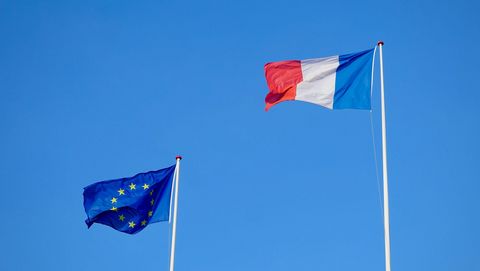Our vision on …
The end of the French EU Presidency

On 30th June, France’s Presidency of the Council of the European Union comes to an end. We look back on how the country’s priorities for the bloc have been realised over the past six months.
Back in January, Emmanuel Macron outlined his vision for France’s Presidency of the EU in a speech in Strasbourg. France’s three main ambitions to focus on during its presidency were:
- A more sovereign Europe
- A new European model for growth
- A humane Europe
Only weeks after France assumed its position, the EU was rocked by the Russian invasion of Ukraine. Developments since then have put France’s agenda to the test, but also offered the chance to demonstrate its importance for the EU.
A more sovereign, humane Europe
As the EU rushed to coordinate a response to the invasion of Ukraine, France’s desire for ‘a more sovereign Europe’ was tested to a greater degree than anticipated. Nonetheless, the bloc’s strong reaction to events gave France the opportunity to show how its ambitions could be realised. The Versailles Declaration of 11th March put France front and centre of the EU’s public reaction to events
With the EU’s strongly coordinated set of economic sanctions, plus a radical reassessment of the its dependency on Russian energy, came a strong assertion of unity among EU nations.
Emmanuel Macron has long been known to harbour grand ambitions for the EU – but his latest idea of a ‘European Political Community’, a model which would give nations like Ukraine some way of associating with the EU without being full members, has not yet been widely embraced by officials.
A new European model for growth
France’s ‘new European model for growth’ revolved around making Europe ‘a land of production, job creation, innovation and technological excellence’. France can reasonably claim to have presided over several important developments in this field.
To take one particular example, the European Parliament recently approved a law obliging all mobile phone operators to fit their devices with USB-C charging ports – effectively meaning a universal charger for all phones. As well as creating a common European standard, this change is designed to reduce electronic waste – tying in with France’s desire to boost sustainable innovation.
EU lawmakers have also recently agreed a deal on the ‘EU Carbon Border Adjustment Mechanism’, a law aiming to cut the bloc’s greenhouse gas emissions by 55% by the end of the decade and set it on the road to net zero.
EU-UK relations
The Northern Ireland protocol has remained a sticking point in post-Brexit dialogue throughout France’s presidency. What seemed like verbal jousting back in January, however, now looks more serious in view of Parliament’s recent vote to override the Brexit bill.
Nonetheless, we continue to hear familiar tales about the physical and strategic closeness of the EU and the UK. Especially in light of recent geopolitical events, this still means that a complete breakdown in relations looks far from likely.
Looking ahead
The Presidency of the Council of the EU will now go to the Czech Republic until the end of 2022, with Sweden taking over at the beginning of next year – completing the current ‘trio’ of presiding countries.
The Czech Republic’s agenda has been strongly influenced by the invasion of Ukraine, and will extend France’s focus on defence to building up a stronger European cyberspace.
Overall, then, the challenging circumstances of the past six months seem to have highlighted the salience of France’s ambitions for the EU.